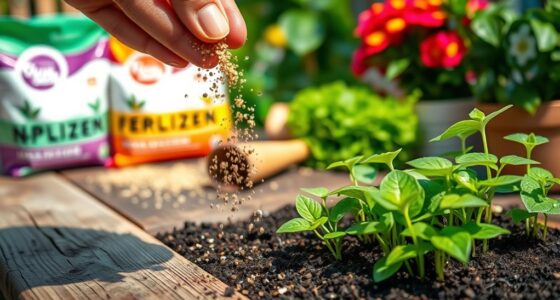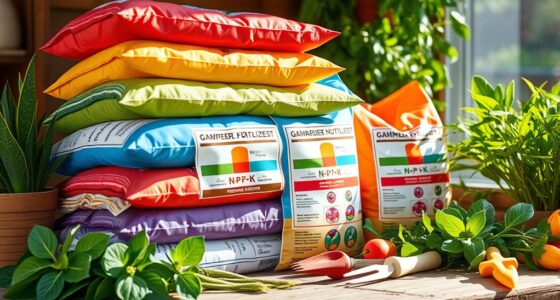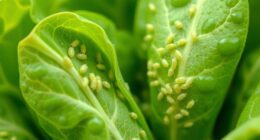Understanding N-P-K ratios helps you give your plants what they need for healthy growth. N (nitrogen) promotes lush leafy growth, P (phosphorus) supports root and flower development, and K (potassium) boosts overall plant health and disease resistance. Knowing your plants’ specific needs guarantees you choose the right fertilizer. By adjusting ratios and types, you can optimize growth. Keep exploring to learn how soil pH and organic options play a crucial role in fertilizing effectively.
Key Takeaways
- N-P-K stands for Nitrogen, Phosphorus, and Potassium, the primary nutrients in fertilizers essential for plant growth.
- Understanding your plants’ specific nutrient needs helps choose the right fertilizer formulation.
- Nitrogen promotes leafy growth; phosphorus supports roots and flowering; potassium enhances overall plant health.
- Soil testing guides proper fertilizer application, ensuring balanced nutrient levels and avoiding deficiencies.
- Organic fertilizers provide a slow release of N-P-K nutrients, improving soil health and supporting sustainable gardening.

Have you ever wondered what makes plants grow strong and healthy? The answer lies in understanding the essentials of fertilizing your plants properly. One key factor is soil pH, which plays a critical role in nutrient absorption. If your soil is too acidic or too alkaline, your plants might struggle to take up the nutrients they need to thrive. For example, many vegetables prefer a slightly acidic soil pH between 6.0 and 7.0. Testing your soil pH regularly helps you determine if adjustments are necessary, and you can easily amend your soil with lime or sulfur to bring it into the ideal range. This way, nutrients become more available, and your plants can grow robustly.
Alongside soil pH, organic fertilizers are an excellent choice for nourishing your plants naturally. These fertilizers come from organic sources like compost, manure, or plant-based materials, providing a slow and steady supply of nutrients. Unlike synthetic fertilizers, organic options improve soil structure, enhance microbial activity, and reduce the risk of over-fertilization. When you incorporate organic fertilizers into your gardening routine, you support a healthy soil ecosystem that benefits your plants in the long run. They also tend to release nutrients gradually, which helps prevent nutrient runoff and pollution. Whether you’re growing vegetables, herbs, or flowers, organic fertilizers provide the essential nutrients—primarily nitrogen, phosphorus, and potassium—in a balanced way suited to your specific plants.
Understanding how soil pH and organic fertilizers work together can greatly improve your gardening results. For example, if your soil is too acidic, adding organic matter like composted leaves or manure can help buffer the pH and supply necessary nutrients. Conversely, if the soil is too alkaline, incorporating sulfur-rich organic amendments can help lower the pH to a more suitable level. Regularly testing your soil pH and adjusting with organic fertilizers ensures your plants have access to the nutrients they need, promoting healthy growth and better yields. It’s also beneficial to use organic fertilizers that contain a mix of macronutrients and micronutrients, ensuring your plants aren’t missing out on essential elements. Recognizing the importance of soil health can lead to more sustainable and productive gardening practices.
Frequently Asked Questions
How Often Should I Fertilize My Indoor Plants?
You should fertilize your indoor plants about once a month to support healthy growth, considering their watering schedule and light requirements. During active growing seasons, like spring and summer, you might fertilize a bit more often, while in fall and winter, reduce frequency. Always check if your plants need extra nutrients, especially if they show signs of slow growth or pale leaves, and adjust accordingly.
Can Organic Fertilizers Replace Synthetic Ones Entirely?
You wonder if organic fertilizers can fully replace synthetic ones. Organic versus synthetic fertilizers each have pros and cons, but organic options usually have a lower environmental impact, making them more eco-friendly. While organic fertilizers improve soil health gradually, synthetic ones deliver quick nutrients. You might find a balanced approach best, combining both, depending on your plants’ needs and your environmental values.
What Are Signs of Over-Fertilizing Plants?
Imagine your plants whispering for help as their leaves yellow and wilt unexpectedly. You might notice plant toxicity signs like browning leaf edges or stunted growth. Over-fertilizing causes fertilizer burn, leaving dark, crispy patches and weak stems. If you see these symptoms, it’s a clear sign you’re pushing too hard. Be cautious—too much fertilizer can harm your plants more than neglect, so always follow recommended amounts carefully.
Is It Necessary to Adjust Fertilizer Types for Different Plant Stages?
You might wonder if you need to adjust fertilizer types as your plants mature. The answer is yes; different plant stages require specific fertilizer adjustments. During early growth, a high nitrogen fertilizer helps foliage develop, while flowering or fruiting stages benefit from increased phosphorus and potassium. Monitoring plant maturity guides these changes, ensuring your plants get the right nutrients at the right time for healthy growth and peak yields.
How Do Soil Types Affect Fertilizer Effectiveness?
Imagine your garden’s soil as a bustling marketplace, where soil chemistry influences how nutrients are exchanged. Different soil types, like sandy or clay, affect nutrient availability, making some fertilizers more effective than others. You need to match fertilizer types to your soil’s unique chemistry to guarantee plants absorb essential nutrients efficiently. By understanding your soil’s characteristics, you can boost plant health and achieve vibrant, thriving growth.
Conclusion
So, next time you’re sprucing up your plants, remember: N-P-K is like their secret recipe, not some mystical potion. Mix it wrong, and you’ll end up with a plant that’s as happy as a cactus in a rainforest. Think of fertilizers as the plant’s fast-food joint—serve the right nutrients, or watch your greenery go from lush to “what happened?” with a sigh. Happy gardening, and don’t forget to feed those green babies!









